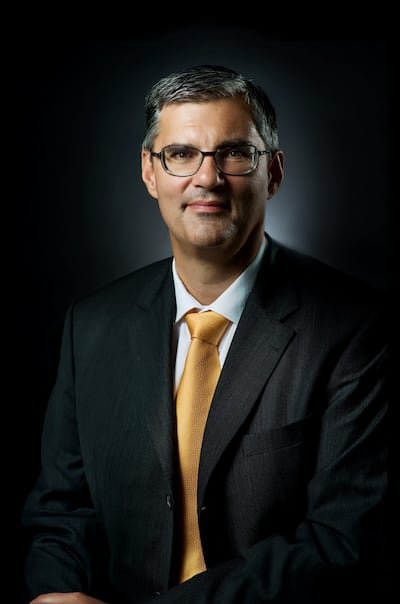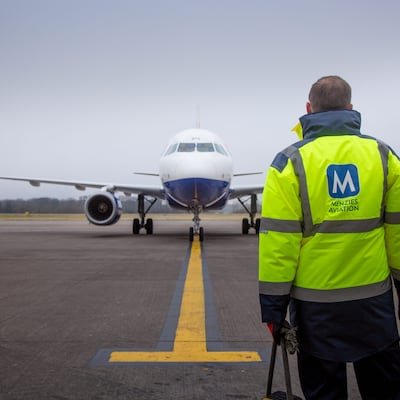Kuwait’s Agility is considering plans to dual list shares of its Abu Dhabi-listed subsidiary Agility Global on Saudi Arabia’s Tadawul stock exchange, a move that will give its shareholders and investors exposure to the Arab world’s two largest equity markets, its vice chairman said.
Option to cross-list shares of Agility Global, which made its trading debut on the Abu Dhabi Securities Exchange just last month, could come up for discussion at the board level “in the very near future”, Tarek Sultan told media in an interview.
Agility intends to properly plan the potential listing and work with regulators in the UAE as well as in the kingdom to ensure “this is something that is well-received and done in the right way”.
“We’re going to study this matter, look at all the pros and cons and weigh it up and then make a decision,” Mr Sultan said. “It is a very intriguing option. We haven’t made a final decision about it [yet] but it is something that we are investigating.”
Agility Global will be the second company after Americana – the largest quick-service restaurant operator in the Mena region, which raised $1.8 billion from its initial public offering in 2022 – to have a dual listing on both the ADX and Tadawul.
The two stock exchanges have well-defined bilateral agreements in place that would allow a company on the ADX to do dual list on the kingdom’s bourse in a short span of time and “that’s something that’s important for us”, Mr Sultan said.
It’s also important for Agility’s shareholders and investors who want to make sure that the companies they invest in are present in major markets in the region.
“At the end of the day, they want exposure to the emerging markets, they want exposure to the big economies of the Middle East, and you can’t have that in a fundamental way if you’re not present in the kingdom,” Mr Sultan said.
Agility Global, which is the operations and assets management unit of Agility, listed shares on the ADX on May 2, a move which Mr Sultan said will allow the company to “diversify our sources of capital and tap into potential new opportunities, both for financing, but also for developing our businesses strategically”.
With the listing on the ADX, Agility Global – whose portfolio includes services company Menzies Aviation, Tristar, a global fuel logistics business, as well as Agility’s global logistics parks business in Saudi Arabia, Africa and South Asia – is being “positioned properly” as a global business, which unlocks further value for the shareholders.
Agility, the biggest logistics company in the Middle East and North Africa region, has carried forward growth momentum from last year despite economic headwinds and the escalations in the geopolitical tensions in the Middle East.
The company’s net profit for last year rose an annual 22 per cent. It repeated the performance in the first quarter of this year and Mr Sultan expects Agility to continue the momentum in 2024 despite disruptions in trade flows through the Red Sea amid the Israel-Gaza war.

While the raging conflict in the Middle East has impacted some parts of the company’s business, it has created opportunities for others.
Attacks on commercial vessels by Houthis have made shipping containers very difficult through the Red Sea. However, Agility has seen a rise in the movement of goods by air and the company is working around the clock with customers to “sort these issues out”.
“In a nutshell, I think the shocks that we’re seeing now are rather limited in size and impact and something that we are well set up to handle,” Mr Sultan said.
The Red Sea disruptions and flow of trade through the Suez Canal – a more direct route for shipping between Europe and Asia – have also affected regional and global trade. There is also the risk of the Israel-Gaza war becoming a regional conflict.
In 2023, approximately 22 per cent of global seaborne container trade passed through the canal. Goods such as natural gas, oil, cars, raw materials and many manufactured products and industry components were carried to and from the Indian Ocean, the Mediterranean Sea and the Atlantic Ocean.
Transits fell by more than 40 per cent, while the container tonnage crossing the canal fell by 82 per cent from their peak until the middle of February, in the wake of attacks on commercial vessels in the busy shipping lane, according to a UN Trade and Development report.
However, the size and scope of shocks are so far curtailed and are nowhere close to what global trade had to suffer during the Covid-19 crisis, Mr Sultan said.
“If you take a step back, and you look at this from a big picture [perspective], it really underscores the good work that the region especially the GCC has been doing in developing their own local supply chains – their railway networks, their ports, their connectivity by air,” he said.
Strengthening supply chains and developing trade resilience have been among the top priorities for the Gulf nations and that basically provided the GCC with “a lot of options to actually deal with shocks”, he said.

“I think they basically have been able to overcome, to a large extent, the impact of having the Red Sea and Suez Canal kind of closed off to them as a way of transporting goods,” Mr Sultan said.
Agility, which is present in countries that account for about 95 per cent of global gross domestic product, does not seek entry into new markets. To maintain growth, the company is focused on the strengthening its position in the existing markets.
The company, which is among top logistics parks and infrastructure developers in the Middle East and Africa, plans to develop the two million square metres of land it owns close to urban centres and transports hubs in India.
The development work has already begun on a few locations, Mr Sultan said, declining to give the value of investments it plans in Asia’s third-largest economy.
“The amount of capital we actually deploy is completely opportunity dependent … and the way our model works is we look to attract high quality tenants that have a long-term interest in being in India and to the extent that we find them, we don’t put any limitation on the amount of money we invest,” Mr Sultan said.
“We don’t just invest in speculative building projects.”
Agility has evolved to become a multi-business operator and investor open to merger and acquisition opportunities to accelerate growth.
“We’re really looking to grow each one of our businesses … organically and inorganically,” Mr Sultan said.
“To the extent that we can find opportunities that will do nicely with our core businesses. We will investigate those opportunities and do what’s best for our shareholders.”
The company is looking to acquire and grow business like it did with airport services provider John Menzies, which has now become the largest aviation services provider in the world, with operations in more than 60 countries and nearly 300 airports.
Agility finalised its £763 million ($921.5 million) acquisition of UK-based Menzies in 2022. It owns a stake in global fuel logistics company Tristar, while its other portfolio companies offer services including customs digitisation, remote-site infrastructure, defence and government, e-commerce and digital logistics.
The company also invests in supply chain innovation, sustainability, green infrastructure and has minority holdings in a growing portfolio of listed and non-listed companies.
In October last year, the company invested in Loop Global – a US developer of hardware and software for electric-vehicle charging stations and networks.
The investment by Agility Ventures, the company’s corporate venture capital arm, is a sign of more investment to come in the green technology, Mr Sultan said.
“Loop is a company that provides the technology to fast charge and do so at a very low cost,” he said. The company has the potential to be part of the EV charging infrastructure in the wider Middle East, particularly in the GCC, he added.
“We are certainly looking to grow Loop’s presence,” he said.
“One characteristic of the GCC is that there is a major shortage of EV charging infrastructure … we have the right solution for that problem set.”
While Agility intends to be a part of the “infrastructure solution and to provide differentiated technologies” it is also open to investments and partnerships that will allow it to own part of the EV charging infrastructure in the Gulf markets, he said.
“As a company to invest in infrastructure, we are happy to develop the project in any way, shape or form and [if] that means that we have to own part of the infrastructure, we’re open to it,” Mr Sultan said.
“It really depends on the opportunity and how it’s presented.”









 United Arab Emirates Dirham Exchange Rate
United Arab Emirates Dirham Exchange Rate